Rina Bassist

Russian President Vladimir Putin hasn't reached out to Israel since the attack by Hamas last Saturday, focusing his statements in the past few days instead on the rights of the Palestinian people.
"The Palestinian problem is in the heart of every person in this region…And everything that is happening — not only now, but what has been happening for decades — is perceived as a manifestation of injustice, which has been elevated to some incredible degree," Putin said on Wednesday.
This lack of a strong condemnation by Moscow and what is being perceived in Israel as false equivalence between Hamas and the Israeli government, reflects an increase in the chilling of relations between Russia and Israel.
Speaking at the Arab League meeting on Wednesday, Russian Foreign Minister Sergey Lavrov said that Moscow was “deeply concerned that hundreds of Israelis and Palestinians have died and that the Gaza Strip has been declared a target for Israeli retaliation,” without pointing a finger at Hamas.
Two days earlier, Al Jazeera reported that the members of the United Nations Security Council failed to reach an agreement on a text condemning Hamas. The tv chain said it was apparently Russia who blocked the text.
More so, the negative approach by Moscow stands in stark contrast with the strong and unequivocal support offered to Israel by Ukraine in the past six days. Ukrainian President Volodymyr Zelenskyy called Wednesday in Brussels on NATO leaders to support Israel, encouraging them to travel there to clearly express that support.
Since the attack by Hamas, Israel’s Prime Minister Benjamin Netanyahu has received phone calls from numerous world leaders, including US President Joe Biden (they spoke four times already), French President Emmanuel Macron (twice), German Chancellor Olaf Scholz, Italian Prime Minister Giorgia Meloni and Zelenskyy.
In contrast, Putin has not called Netanyahu despite the long relationship between them. Israel’s Foreign Ministry confirmed to Al-Monitor that no phone call has been received so far from Lavrov either. This is despite the fact that at least one of the people killed in the attack was a dual Israeli-Russian citizen.
Ties between Israel and Russia cover many domains. But one of the most important for Israel is security, namely the channel of communication established several years ago by security officials on both sides to enable the Israel Defense Forces to strike Iran-affiliated targets in Syria. Russia is also a member of the United Nations Security Council and maintains relations with Iran, which are two important additional reasons for Israel to keep its relations with Moscow intact.
These efforts have been especially visible since the Russian invasion of Ukraine. Israel positioned itself on the Ukrainian side but made huge efforts not to provoke Russia too much by refusing to supply Kyiv with weapons.
Now it seems these efforts were not appreciated by Moscow. Meeting with Iraqi Prime Minister Mohammed Shia al-Sudani last Tuesday, Putin didn’t spend any time blaming Hamas but rather pointed a finger at the United States for the escalating conflict. “I think that many people will agree with me that this is a vivid example of the failure of United States policy in the Middle East,” said Putin. On the same day, in a conversation with Turkish President Recep Tayyip Erdogan, “emphasis was placed on the sharply worsening situation in the Israeli-Palestinian conflict zone,” the Kremlin said in a statement. A day later, Putin reiterated the importance of creating a Palestinian state.
"Moscow's conduct since the barbaric attack by Hamas and the outbreak of war highlights a cooling of the relations between the countries. Russia gives Israel a cold shoulder. Neither Putin nor Lavrov condemned Hamas, and they didn’t recognize Israel's right to defend itself," Israeli journalist and Russia analyst Yair Navot told Al-Montor.
According to Navot, "Putin and Lavrov did call on both sides to minimize hurting civilians, but mostly they leveraged the outbreak of the war to attack Washington and its policies regarding the Israeli-Palestinian conflict."
Navot notes that the rapprochement between Moscow and Tehran against the backdrop of the war in Ukraine could also explain the cold shoulder. "The great American support for Israel is likely to exacerbate the trend of distance between Israel and Russia," added Navot.
Israel has not reacted so far to Putin's declarations. Retired Ambassador Nimrod Barkan headed the Israeli Foreign Ministry’s strategic center. For him, the military presence of Russia in Syria is too significant for Israel to allow itself to be provoked. He also notes that Putin and Netanyahu had nurtured over the years a good relationship, so the likelihood of the Israeli premier coming out against the Russian president is slim to none.
Zvi Magen has served as ambassador to both Ukraine and Russia. "Until recently, Russia made sure to maintain positive relations with Israel. They maintained a sort of balance between Israel on one side and Syria and Iran on the other. But that has changed. Relations with Iran get tighter by the day while indirectly sending negative messages to Israel," noted Magen.
"It is still unclear how far Moscow will go with its messages on the Hamas war. The Israeli government is aware of this negative trend in the relations, though it will probably continue its efforts for a certain balance vis-a-vis Moscow and Kyiv," he added.
No comments:
Post a Comment